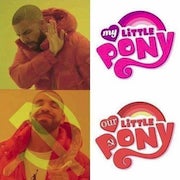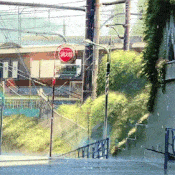|
CPColin posted:Part of that is because they're disgusting, awful litterers and gently caress them. Sydin posted:Also it is at least on paper illegal to throw a cigarette butt out the window of your car, even it is pretty much never enforced unless you're a minority doing it right in view of a very bored cop. It's not illegal to drive a stake into the ground on your own property. Well sure, it's viewed as disgusting and illegal now. But the liability was always there. Someone driving their car in dry grass on their own property is a fire hazard as well but it's not illegal or widely viewed as disgusting.
|
|
|
|

|
| # ? May 10, 2024 09:23 |
|
Admiral Ray posted:Well sure, it's viewed as disgusting and illegal now. But the liability was always there. Someone driving their car in dry grass on their own property is a fire hazard as well but it's not illegal or widely viewed as disgusting. If you want to make changes, allowing unmanaged dry grass in large areas without fire modification is the problem, not the unlimited "normally safe" activities that could start a wildfire in dangerous conditions. In offer a words, make creating the unavoidable fire hazard the negligent condition, not the trivial act that inevitably starts a fire there.
|
|
|
|
Admiral Ray posted:It depends on the level of social responsibility you hold people to. For a corporate entity such as PG&E and its officers we should penalize them for failing in their social duty of not burning us in our homes or choking our air while they deliver our power. Should we hold the random farmer to the same level of social responsibility? That's a harder question. I agree with Dead Reckoning that you accept the risk of sparks whenever you hammer a nail or a stake. Most of the time it doesn't matter. This time it did. We all hold the smoker that throws their lit cigarette butt out of the car window responsible for the fires they cause despite the fact that most of the time it doesn't matter that they do it. I don't think the average person expects to strike sparks when hammering a metal thing with a hammer. Have you ever seen a spark while hammering a nail? I haven't. I suspect in this case the spark may have come from the stake striking a stone, although that's pure speculation. There's also the fact this farmer had water sources nearby, he might have felt he was prepared to deal with a small fire, in general during the course of his work. Thousands of workers everywhere work all day doing things that could strike a spark, but are unlikely to do so and then start a fire; exactly how careful do we expect people to be? We know that smokers tossing cigarettes out windows cause fires all the time: farmers striking sparks is not something society can be expected to have heard about or know about. At least, that's something that a prosecutor would have to consider, when deciding whether to press charges. I think we here in this thread don't have enough facts to prove culpability beyond a reasonable doubt, but we're relying on media reports, not direct evidence provided by a police investigation. If strict liability applied, though, the prosecutor could ignore such things: the fact of the farmer having started the fire would be sufficient for a guilty verdict, no matter what the farmer was intending to do or how careful the farmer was actually being. Regardless, I think it's important to understand that there are competing interests when we decide what behavior we're going to punish using the overwhelming power of the state. DR seems to have been arguing for a strict liability for starting fires, and that fits into a broader theory about strict liability. As I understand it, it's best used when we demand that people take extraordinary care, well beyond what a normal person might consider "reasonable" - usually related to behavior that is completely optional. But also, with few exceptions, strict liability is used where the punishment will not be so impactful as to ruin someone's life or destroy their career or livelihood. (Statutory rape being the most prominent - and I'd say controversial - exception to that latter principle.) quote:The salience of mens rea is more difficult. For some cases it's clear that it matters because it's not just the crime but the potential for further crime that we fear. It's not the single action, it's the pattern. A murder borne of malignant hate is more heinous to society than one borne of heated passion and is punished accordingly. A single case of negligence doesn't necessarily constitute cause to punish, merely correct. Multiple cases of negligence following correction ceases to be negligence in the eyes of others. The consequence changes social reaction as well. Does mens rea matter when fires burn? I don't think "potential for future crime" is the only consideration, or even the most important. IMO the most important factor encoded in American law is the protection of the innocent, and that explicitly includes those accused of a crime. This is why we use a "beyond reasonable doubt" standard for criminal law, as compared to far more lax "preponderance of evidence" standards for e.g. civil trials. Strict liability strips away the "but I was innocent of intent" and "but I behaved reasonably" and "but no normal person could have expected this to happen" affirmative defenses; it has to be very carefully justified in order to be used for felonies. An example of typical strict liability is parking tickets. Your car was parked in a red zone, you get a ticket, it doesn't matter that it was too dark to see the curb at that moment, or there was an emergency, or you were distracted; your intent is considered unimportant because the consequences are just a ticket and fine, so not life-altering, and the societal need to keep red zones free of cars is considered more important than the injustice that some percentage of ticketed people will have been acting in good faith and merely made a mistake. The possibility of getting a ticket for breaking the rules is already a deterrent against intentional violations in the future, irrespective of the strict liability factor: the strict liability does not prevent more violations all by itself. Where it can have an affect is sheer volume: courts can apply the law far more times to far more violators when they don't have to bother with hearing mens rea defenses. So, we can see that strict liability is a useful tool where there the courts need to be protected from being overwhelmed in order for the rules to remain relevant (cities handle hundreds of parking tickets a day, which you can argue is necessary in order for parking rules to have any affect). So, do we need strict liability, to handle all the wildfire cases? I'd argue not. In which case, ignoring culpability and just punishing everyone who starts a fire doesn't add to the effectiveness of the law; and considering intent before punishing people still ensures that those who were negligent (by whatever standards of negligence you'd care to establish with the laws about fire-starting!) are actively prevented from doing it again. I think the question's wrong. Mens rea doesn't "matter" when fires burn: what matters is preventing fires while protecting the innocent, and mens rea isn't an obstacle to the former while being essential to the latter. Leperflesh fucked around with this message at 19:19 on Jun 13, 2019 |
|
|
|
Leperflesh posted:IMO the most important factor encoded in American law is the protection of the innocent, and that explicitly includes those accused of a crime. hah, that's definitely just in your opinion e: since this is normal dnd lemme quote some applicable legal analysis from the cop thread nm posted:Its actually up to 72 hours, but some states, like CA, limit it to 48 hours (excluding sundays and holidays or if the court is closed for the day -- like 48 hrs expires after 5PM or something). And that is for filing. A judge does not really review the charge for validity (but can set bail based on the assumption you did it) except on teh face of the charging document. That's what the prelim is for. (In California for misdemeanors, you can have the the judge evaluate probable cause at arraignment if in custody because there is no prelim.). Prelim dates depend on how civilized your state is, some "civilized" states like California set it at a a 10 court day (aka 2 drat weeks) while others just make it reasonable (the feds are 30 days). Lose you prelim? (You will.) You then have 60 actual days to be brought to trial after that (actually after the next arraignment, which is a few days later), here, but most states set it at "reasonable" which is why you have dudes at Rikers for years. (Cases in California can be continued beyond 60 days if the defendant agrees, and that is often, but not always, a good idea. You can also restart the clock at any time as a defendant here.) look at that wonderful protection of the innocent, you'll be graciously granted a pittance after losing your house and job but hey at least we're better than the other bastion of liberalism new york, where yearlong stays and practically indefinite detention are the norm truly california is a bastion of preservation for those accused of crimes edit 2: if you want to claim the end of cash bail negates this point 1) lol no 2) we didn't actually end it, implementation is on hold pending a referendum, which will easily overturn it because californians are vile monsters, next year https://www.latimes.com/politics/la-pol-ca-bail-overhaul-referendum-20190116-story.html atelier morgan fucked around with this message at 19:53 on Jun 13, 2019 |
|
|
|
Sydin posted:Also it is at least on paper illegal to throw a cigarette butt out the window of your car, even it is pretty much never enforced unless you're a minority doing it right in view of a very bored cop. It's not illegal to drive a stake into the ground on your own property. So idk, its entirely possible he was in violation of the defensible space law: quote:Cal Fire said Thursday that the Ranch Fire last July began when a property owner in Potter Valley, in Mendocino County, was installing a shade barrier. After disturbing an underground nest of yellow jackets, the man hammered a two-foot-long concrete stake into the ground to plug the hole, according to Cal Fire’s investigative report. Assuming Cal Fire is correct and it was the hammer's spark, that seems like he wasn't keeping the fuel load down: quote:CHAPTER 3. Mountainous, Forest-, Brush- and Grass-Covered Lands [4291 - 4299] ( Chapter 3 added by Stats. 1965, Ch. 1144. ) Seems like if there was enough tall grass for a spark to cause a wildfire there was enough tall grass for an average wildfire would burn too. But this is all just idle speculation.
|
|
|
|
Infinite Karma posted:There's also room for accidents that aren't negligent, even when using best practices. Sparks from using a regular hammer on a regular stake are pretty rare, and a single spark like that lighting a fire is almost impossible even if it did occur. But it did this time, and if this guy didn't start it, it could have been ohmic heating in a wire or a piece of glass focusing the sun or a static electric charge or a million other things. This still offloads the responsibility onto individuals unless you are advocating for state administered land management across all private land. For liability the avenue of harm doesn't matter, just the potential. I agree that him allowing his land to become so unruly that a fire was a possibility in such a silly way is the issue, not just the action that caused it to light. A rather instructive case is the Flaming Rat case. In this case a man was in an enclosed space cleaning a piece of machinery with gasoline. A rat living under the machinery was surprised by being soaked with gas and scampered right towards the pilot light of a furnace in the same space. The gas-fire rat then ran right back to its gasoline infused home and lit the vapors, killing the worker. The family sued the company for wrongful death and won. This can be viewed as general liability theory: The particulars of the action are immaterial, only the potential matters. The other option is one of negligent training: why was the worker using gasoline, or any volatile solvent, in such a way? Had there been training warning against this? There hadn't been, so the company was found liable. Leperflesh posted:I don't think the average person expects to strike sparks when hammering a metal thing with a hammer. Have you ever seen a spark while hammering a nail? I haven't. I suspect in this case the spark may have come from the stake striking a stone, although that's pure speculation. There's also the fact this farmer had water sources nearby, he might have felt he was prepared to deal with a small fire, in general during the course of his work. Thousands of workers everywhere work all day doing things that could strike a spark, but are unlikely to do so and then start a fire; exactly how careful do we expect people to be? We know that smokers tossing cigarettes out windows cause fires all the time: farmers striking sparks is not something society can be expected to have heard about or know about. Whenever you are working with metal on metal or metal on dirt there's a chance for a spark. Having seen it or not does not eliminate the possibility. It doesn't mean you don't hammer nails, but you do check around it to ensure you've minimized the chance of a fire. Most society also doesn't know that a mass of oily rags can spontaneously light but that doesn't absolve people working with them of their responsibility to handle it with a reasonable measure of safety. I don't think his actions rise to criminal negligence, but, given the destructive risk, maybe they should. Leperflesh posted:I don't think "potential for future crime" is the only consideration, or even the most important. IMO the most important factor encoded in American law is the protection of the innocent, and that explicitly includes those accused of a crime. This is why we use a "beyond reasonable doubt" standard for criminal law, as compared to far more lax "preponderance of evidence" standards for e.g. civil trials. Strict liability strips away the "but I was innocent of intent" and "but I behaved reasonably" and "but no normal person could have expected this to happen" affirmative defenses; it has to be very carefully justified in order to be used for felonies. Wildfires are an extremely well known threat here. If he allowed conditions on his land to deteriorate to the point that a fire like this was possible I'm not sure why we should care about his mindset. We consider things that create great risk like drunk driving to be criminal regardless of any other conditions at play. Why should this be different?
|
|
|
|
atelier morgan posted:hah, that's definitely just in your opinion If you're saying that criminal procedure in California or the US is garbage and terrible, you'll get no arguments from me. I don't think that's related to "protection of the innocent" being foundational to american law: it's literally in the constitution, which in turn inherits it from English common law. How well the US legal system is functioning is a related but separate factor. I don't think we can even begin to try to re-write laws to take into account the fact that anyone who is even arrested is likely to be treated in such a way as to destroy their livelihoods, ruin their reputations, and possibly leave them homeless. You'd be left with some kind of "oh well get rid of all crimes because we're incapable of handling the process of arresting and holding suspects" or something. Admiral Ray posted:Whenever you are working with metal on metal or metal on dirt there's a chance for a spark. Having seen it or not does not eliminate the possibility. It doesn't mean you don't hammer nails, but you do check around it to ensure you've minimized the chance of a fire. Most society also doesn't know that a mass of oily rags can spontaneously light but that doesn't absolve people working with them of their responsibility to handle it with a reasonable measure of safety. I don't think his actions rise to criminal negligence, but, given the destructive risk, maybe they should. Well, first, the article says it was a concrete stake, so again I'm not sure people could reasonably know a spark might happen. But you are again ignoring my point, which is that under strict liability, merely the fact a fire started would be enough to convict. Ignore this specific case. DR seems to want us to pass laws that mean anyone who causes a fire under any circumstances is guilty without having intent or negligence even being considered. That's what strict liability means. quote:Wildfires are an extremely well known threat here. If he allowed conditions on his land to deteriorate to the point that a fire like this was possible I'm not sure why we should care about his mindset. We consider things that create great risk like drunk driving to be criminal regardless of any other conditions at play. Why should this be different? So you're saying because, in your opinion, this guy was criminally negligent in allowing a fire danger to develop on his land... we can dispense with the completely separate consideration of mens rea defense... you know, the part where someone would have to establish, affirmatively, that they were not negligent? A mens rea defense isn't a get out of jail free card. I merely linked this before, but perhaps it'll help if I go ahead and directly quote: https://en.wikipedia.org/wiki/Mens_rea#United_States quote:Model Penal Code Those are the four general "levels" of guilt. A mens rea defense is about reducing (moving from lower to higher) or eliminating (not even meeting the topmost "negligently" standard) of culpability, by presenting an affirmative argument that the person doesn't fit those standards. Under strict liability, the court cannot consider whether a person was negligent (or worse). I think you should instead be arguing that letting your land get so overgrown it poses a fire risk is prima facie evidence of negligence, a factor which a defendant could then argue against using affirmative arguments about their specific case. Not, arguing that we just go ahead and presume that if someone had a fire on their land, they are guilty of a felony, nevermind the circumstances. We also are generally forbidden from making criminal laws with strict liability, although we know there are exceptions to this already on the books, so it's possible to get around that. Leperflesh fucked around with this message at 21:14 on Jun 13, 2019 |
|
|
|
Leperflesh posted:Well, first, the article says it was a concrete stake, so again I'm not sure people could reasonably know a spark might happen. But you are again ignoring my point, which is that under strict liability, merely the fact a fire started would be enough to convict. Ignore this specific case. DR seems to want us to pass laws that mean anyone who causes a fire under any circumstances is guilty without having intent or negligence even being considered. That's what strict liability means. Oh, sorry, I misunderstood your argument. No, strict liability in cases like this would be absurd.
|
|
|
|
Hardcore law-and-order types think that "sending a message" and/or making sure someone is punished for this outrage, is more important than actual justice or protecting the innocent. Strict liability is an attractive tool for achieving the former. I think it kinda makes sense for poo poo like parking tickets, just because of the sheer expense and difficulty and volume, kinda. I think it's inappropriate for criminal law, even when there's a pressing societal need. Given there's likely not thousands of cases annually of people starting wildfires, I think the current setup where a defendant can potentially show in court that their conduct didn't even meet the minimum "negligent" standard and thereby gain an acquittal is fine. Especially given that 95% of cases are decided by a guilty plea after a plea bargain, so worrying about all those firestarters getting off scott free is a bit misplaced anyway. And as an aside, it always makes me uncomfortable when people point to the details about a case given by some random beat reporter and then call for blood, because reporters make factual errors constantly.
|
|
|
|
Question. So while debating chuds I get the California motor voter bill thrown in my face a bunch. The claim being that it automatically registers people to vote when they get a drivers licence if they check a box that they are a US citizen. How much truth is there to this? Are there any checks at all to make sure that said person is actually a citizen? I googled a bunch and the result I get is a state officials saying that only citizens are registered but nothing on the actual checks in place to verify this.
|
|
|
|
Katt posted:Question. So while debating chuds I get the California motor voter bill thrown in my face a bunch. https://www.weeklystandard.com/holmes-lybrand/fact-check-is-california-registering-illegal-aliens-as-democratic-voters Illegal aliens can check a box that prevents their info from being sent to the sec. of state, but they cannot also register to vote. Those who don't check that box, and who check the box saying they're eligible to vote, have their info sent to the sec. of state. The secretary of state's office verifies citizenship. Per this article: quote:California Assembly Bill 1461 (the New Motor Voter Act) was signed into law by Gov. Jerry Brown in October 2015. Under this law, when eligible voters receive or renew their driver’s license the DMV will send the information to the secretary of state’s office (unless an individual decides to opt out). From there, the secretary’s office verifies the names and citizenship the registers those, who are confirmed as citizens, to vote. So, it's true that anyone, including non-citizens, can attempt to register via motor-voter, by failing to opt-out: but it's not true that non-citizens can actually register this way. Their application will be rejected by the secretary of state. And illegal aliens hoping to get a drivers license but who fail to use the AB-60 checkbox which prevents sending info to the Sec. of State, are essentially outing themselves as illegal aliens to the secretary of state, which is a Bad Idea. Leperflesh fucked around with this message at 22:16 on Jun 13, 2019 |
|
|
|
Leperflesh posted:https://www.weeklystandard.com/holmes-lybrand/fact-check-is-california-registering-illegal-aliens-as-democratic-voters Awesome. Thanks.
|
|
|
|
It's also mentioned in your .gov link, in case someone accuses the article of being misleading:quote:If you indicate that you are eligible to vote, once you complete your DMV transaction online, by mail, or in person, your voter information is transmitted securely and electronically to the California Secretary of State. Once your eligibility to vote is determined, you will be registered to vote.
|
|
|
|
acksplode posted:It's also mentioned in your .gov link, in case someone accuses the article of being misleading: Right, it's unfortunate that the DMV page doesn't explicitly state that that determination of "eligibility to vote" includes active validation of citizenship, but that's implied unless you're deliberately trying to claim it doesn't happen like the right-wing anti-immigrant lies machine.
|
|
|
|
There are some other perils, like not knowing the difference between registering independent and Independant.
|
|
|
|
Isn't "independent" in California worded as "no party affiliation" or something?
|
|
|
|
Yeah, and the Independent Party is George Wallice's hey let's bring back Segregation platform.
|
|
|
|
Ardeem posted:There are some other perils, like not knowing the difference between registering independent and Independant. And the American Independent Party, which is the party created to support George Wallace's presidential bit that had something like 75% of it's members registered thought they were registering as "No Party Preference" http://static.latimes.com/american-independent-party-california-voters/ CA redesigned their ballots after this story to make "No party affiliation" a more prominent choice.
|
|
|
|
I didn't know they'd fixed that. Awesome.
|
|
|
|
Putting that person in prison would serve absolutely no purpose and on that basis alone it would be unjust. It has no rehabilitation value, it doesn't make the people's whose property was burnt whole, and it provides no deterrent effect on someone in the future who is getting swarmed by hornets. It would do nothing except just punish someone for a really lovely series of unfortunate events and assuage someone's outrage that a fire started.
Moridin920 fucked around with this message at 00:08 on Jun 15, 2019 |
|
|
|
Moridin920 posted:Putting that person in prison would serve absolutely no purpose and on that basis alone it would be unjust. This is the consequentialist view, which I share, but of course plenty of folks do not, and they also vote. And run for office.
|
|
|
|
Some Alt-Right, Alt-Right adjacent, and Proud Boy folx showed up at the Capitol today. They held the "Unity Gathering To Save California at the State Capitol" I don't think California is gonna be saved
|
|
|
|
So without doxxing myself or my workplace, my transit agency just recently got hit with a pretty scathing Grand Jury investigation around our oversight and finances. Among other things, one of the main recommendations of the report isn't just to not continue with our current planned light rail extension into a poorer section of the city, but to look into potentially considering shuttering our light rail services entirely. Now to be fair, we operate at an incredibly steep loss for light rail, and ridership has dropped pretty significantly in the last decade (the report complains that ridership has gone down even though local income levels have gone up, which, yes no poo poo you fucks) however the report goes into pretty loving detail about how light rail is outmoded as a viable public transit method, and that we should look into better alternatives, of course without actually listing any of these supposed better options. Now where could the Grand Jury have gotten ideas such as these I wonder...  Ahahahahahahahahahahaha
|
|
|
|
I'm an expert in light rail policy analysis. That's why I say bin all of it regardless of circumstance.
|
|
|
|
What makes light rail better than busses? I like light rail better because I like trains, but the light rail where I live is no faster than a bus, and I can see how busses would be more flexible.
|
|
|
|
DeadlyMuffin posted:What makes light rail better than busses? I like light rail better because I like trains, but the light rail where I live is no faster than a bus, and I can see how busses would be more flexible. Light rail + no rights of way = not better than a bus If the train has to sit in traffic and wait at red lights with everyone else, it's just a more expensive and less flexible bus. If the approach of a train triggers traffic lights to go through intersections without stopping (or the train has its own overpasses/underpasses/elevated sections), then you've got something worth building and funding and supporting.
|
|
|
|
Also you can also build what they call Bus Rapid Transit (BRT) which is putting in a separate lane for buses + right of way. Its basically identical to light rail but cheaper. Cities often opt for light rail instead however because buses have the connotation of being for poor people and planners worry that will discourage riders or making it harder to get funding.
|
|
|
|
FMguru posted:Light rail + rights of way = better than a bus Yep. The main issue with our current light rail sution is that the backbone through downtown is at grade and has to wait in traffic, making it slow as balls. The north and south parts of the line though are mostly great because they are elevated and/or have full right of way. Instead of tearing it up wholesale we should elevate the downtown sections and further expand but of course we have no money for that so
|
|
|
|
DeadlyMuffin posted:What makes light rail better than busses? I like light rail better because I like trains, but the light rail where I live is no faster than a bus, and I can see how busses would be more flexible. E: That said, it looks like OP's stuck between the rock and the hard of having infrastructure that isn't great and is costly to run while being unable to afford the upgrades that would make it great. That sucks. Dead Reckoning fucked around with this message at 23:52 on Jun 19, 2019 |
|
|
|
Sydin posted:So without doxxing myself or my workplace, my transit agency just recently got hit with a pretty scathing Grand Jury investigation around our oversight and finances. Among other things, one of the main recommendations of the report isn't just to not continue with our current planned light rail extension into a poorer section of the city, but to look into potentially considering shuttering our light rail services entirely. Now to be fair, we operate at an incredibly steep loss for light rail, and ridership has dropped pretty significantly in the last decade (the report complains that ridership has gone down even though local income levels have gone up, which, yes no poo poo you fucks) however the report goes into pretty loving detail about how light rail is outmoded as a viable public transit method, and that we should look into better alternatives, of course without actually listing any of these supposed better options. Now where could the Grand Jury have gotten ideas such as these I wonder... Wait is it the 1940s again?
|
|
|
|
Sydin posted:So without doxxing myself or my workplace, my transit agency just recently got hit with a pretty scathing Grand Jury investigation around our oversight and finances. Among other things, one of the main recommendations of the report isn't just to not continue with our current planned light rail extension into a poorer section of the city, but to look into potentially considering shuttering our light rail services entirely. Now to be fair, we operate at an incredibly steep loss for light rail, and ridership has dropped pretty significantly in the last decade (the report complains that ridership has gone down even though local income levels have gone up, which, yes no poo poo you fucks) however the report goes into pretty loving detail about how light rail is outmoded as a viable public transit method, and that we should look into better alternatives, of course without actually listing any of these supposed better options. Now where could the Grand Jury have gotten ideas such as these I wonder... Who Framed Roger
|
|
|
|
I am shocked that a public agency in SD is being pushed to cut funding to useful programs.
|
|
|
|
I’ve practically written off the South Bay as dead for transit, honestly, which is a shame because I grew up there. With regards to rail, the light rail is considered to be one of the worst performing in the nation, for the reasons that Sydin mentioned above. The BART extensions sound pretty cool on paper, but the Berryessa extension has been delayed 2 years and god knows what’s going to happen with the downtown SJ extension. Caltrain electrification also seems be massively behind schedule, if https://caltrain-hsr.blogspot.com/2019/04/foundation-progress-tracker.html?m=1 is anything to judge by. And bus wise, there was a bus revamp planned a few years ago to coincide with the opening of the Berryessa BART station, but because that got delayed, so did the bus network redesign, and then the VTA had a budget deficit despite passing that sales tax (which ALSO got sued and the revenue held in escrow, although the lawsuit did get dismissed) meaning that the bus revamp got cut before it even came into place. Bus lanes would be a cheap way to improve the transit situation, but given how badly El Camino BRT got shot down, HAHAHAHA.
|
|
|
|
Jaxyon posted:I am shocked that a public agency in SD is being pushed to cut funding to useful programs. I like how our new transit czar (NCTD? cal trans? I can’t remember) said that freeway expansion was dead and we needed to cancel the expansions and push transit, then all the small cities loving melted down. Stay classy indeed.
|
|
|
|
Hasan Ikhrata, SANDAG Executive Director. I'm cautiously optimistic about what he's saying, but we'll see.
|
|
|
|
siotle posted:Hasan Ikhrata, SANDAG Executive Director. Considering how hosed his predecessor was, I am also cautiously optimistic. But I do some consulting work with the City, and making positive change is pretty difficult. Not a forward-thinking institution
|
|
|
|
So aside from the stigma that busses are for the poors BRT and light rail with right of way are roughly equivalent in terms of the transportation they provide? I wanted to like the light rail in my city but it's just so incredibly slow. I don't think either brt or right of way for light rail are in the plans :-(
|
|
|
|
Squalid posted:Also you can also build what they call Bus Rapid Transit (BRT) which is putting in a separate lane for buses + right of way. Its basically identical to light rail but cheaper. Cities often opt for light rail instead however because buses have the connotation of being for poor people and planners worry that will discourage riders or making it harder to get funding. I like the fact that with something like BRT you can have a separate right of way, then at the end go off onto the surface roads in suburbia to get people close to their homes without them having to get off light rail and transfer to connector buses. However that dedicated road surface is going to get bumpy just like any other road, whereas rails tend to have to be smoother. Also rails have larger radius turns than a bus can do. I think both of those things add up to a smoother, more comfortable ride on light rail - yes you still have to sit next to someone who is potentially smelly, but at least they're not being thrown into you every time you go over a bump or around a corner. Maybe that's why "buses are for poor people" - they are in fact not quite as nice? I don't feel like the difference is that significant though.
|
|
|
|
Electric light rail is smoother too without a rumbling Diesel engine.
|
|
|
|

|
| # ? May 10, 2024 09:23 |
|
My issue with buses isn't that they're "for the poors" and more: a) traffic is already a nightmare around here and all discontinuing even a lightly used LR would do is increase traffic, even if the majority of those folks switched to buses b) Transitioning the LR tracks to dedicated bus lanes would be a great solution to this like a goon earlier pointed out, but I doubt we could get much support for it (also this would cost a decent chunk of money, and we the biggest sticking point in the report was how much we've wasted the ~taxpayer dollar~) c) While we do have a plan to transition to FEV buses, its like a 20 year timetable because building out the charging and generation infrastructure has been a huge headache. So all you'd be doing is adding more petroleum-fueled vehicles to the fleet. While I understand one gas-engine bus > several gas-powered cars, I doubt it cuts down emissions compared to electrically powered LR. I admit our LR system has huge glaring flaws such that most would rather fight through gridlock traffic than use it to slog through downtown, but all ripping it out would do is put more vehicles on the road and make the gridlock worse, except now with no alternative. What we should be doing is transitioning the LR to an elevated or subway solution, while also putting more effort into fully integrating with another transit agency to our north that services a city a huge portion of our residents commute to for work so there's a viable public transit option between our cities besides very expensive CalTrain tickets or Tech Company BusesTM, but again that would have to come out of the taxpayer's pocket.
|
|
|




































